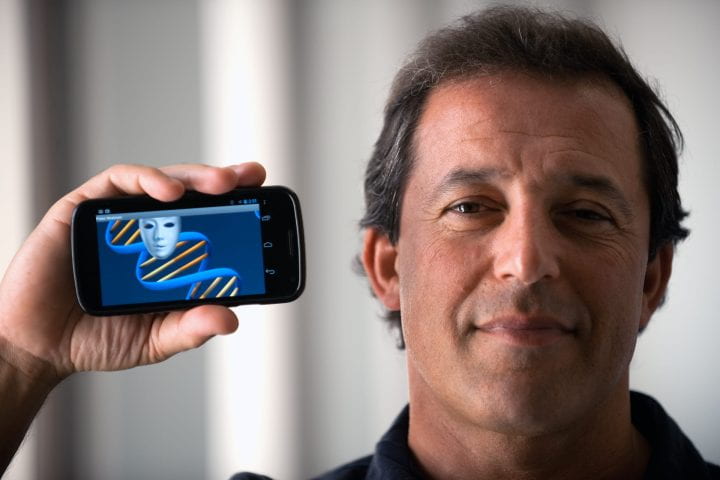Gene genie
UCI smartphone app permits secure storage, testing of DNA data

“Imagine you’re on a first date,” says Gene Tsudik, UC Irvine professor of computer science, hoisting a smartphone to illustrate his team’s latest work – an app that will let people safely store and use their own DNA on a mobile device. “You and the other person could hold up your phones, exchange tiny amounts of encrypted information and be able to determine how much common ancestry you have. Or you might be able to estimate the odds of your future children being born with something like Down syndrome.”
Tsudik and others at the Donald Bren School of Information & Computer Sciences have dubbed the app GenoDroid and say it could also be used for secure paternity tests, customized cancer-fighting drugs and more.
Tested on the Android platform with publicly available genome data, the app can determine in less than half a second whether one individual is another’s father. More importantly, Tsudik says, because of advanced encryption techniques, only a small fraction of each person’s DNA is needed, while the rest remains secure.
“A virtual treasure trove of frighteningly personal and sensitive information is contained in one’s genome,” he and fellow authors wrote in a recent paper for the Association for Computing Machinery. “Our protocols only yield the test results and do not disclose individuals’ genomic information.”
Tsudik emphasizes: “Maintaining the privacy of your DNA is crucial. Imagine the potential consequences if it were to leak out. For example, you could be denied health or life insurance. When your bank account or credit card is compromised, the situation is painful but recoverable. You can close the account, wipe the slate clean and start over. You cannot change or revoke your DNA once it’s leaked.”
GenoDroid builds on earlier work by Tsudik and other computer scientists, including his colleague Chancellor’s Professor Pierre Baldi, who specializes in bioinformatics. The two of them kicked around some ideas for how to securely run genetic tests in real-world applications. “Together, we identified paternity tests as a starting point,” Tsudik says.
Last year, he discussed the concept with members of his research team. They set to work, first brainstorming on whiteboards and then spending long hours coding. Within months, they had designed and prototyped software for smartphones.
“We wanted to show the world that it’s not only possible in theory, it’s possible today,” Tsudik says.
GenoDroid capitalizes on the increasing availability of genome sequencing. Services like 23andme already allow consumers to send in a cheek swab and receive their own digitized genome. While this can cost hundreds of dollars now, prices are dropping fast. Once people have their information in electronic form, they’ll be able to load it onto their smartphones, and GenoDroid would encrypt it. The UC Irvine team will release the next version of the app when such DNA digitalization becomes commonplace.
GenoDroid also holds promise in the rapidly growing area of personalized medicine. Having their genome on a smartphone could permit individuals to learn quickly and inexpensively whether they’re genetically predisposed to major health conditions such as Huntington’s disease, certain mental illnesses or additional risks.
Pharmaceutical companies currently produce highly customized drugs for certain cancers and other ailments employing specific DNA markers. However, some consumers fear losing insurance coverage if their results are shared, Tsudik notes, and companies don’t want to reveal proprietary information about customized treatments. The electronic “double-blind” nature of GenoDroid offers a solution: Each side uses encrypted versions of the other’s data and learns only the outcome – for instance, match or no match – and nothing more.
Other members of the GenoDroid project team are Emiliano De Cristofaro, who earned his doctorate at UC Irvine and is now with Xerox’s Palo Alto Research Center; UC Irvine Ph.D. student Sky Faber; and former UC Irvine postdoctoral researcher Paolo Gasti, currently at New York Institute of Technology.